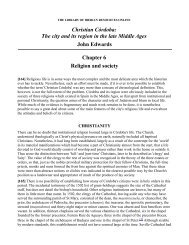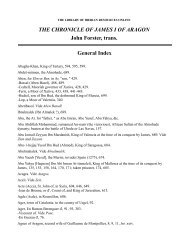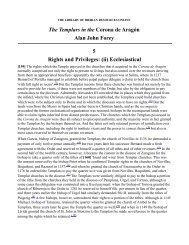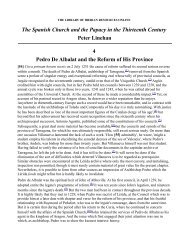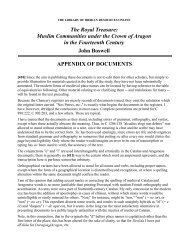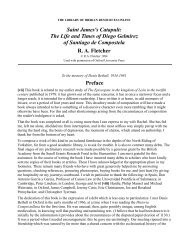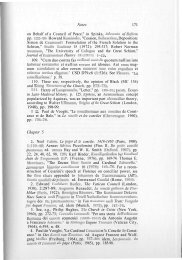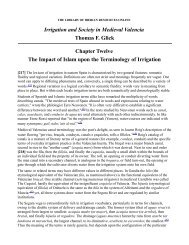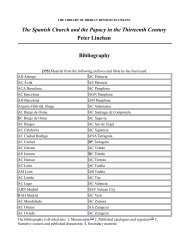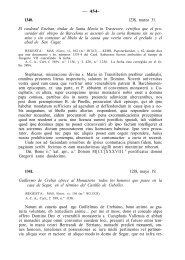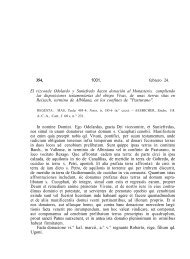PROTESTANTISM - The Library of Iberian Resources Online
PROTESTANTISM - The Library of Iberian Resources Online
PROTESTANTISM - The Library of Iberian Resources Online
Create successful ePaper yourself
Turn your PDF publications into a flip-book with our unique Google optimized e-Paper software.
and causing scandal, they were to be arrested and transmitted to the tribunal for trial. <strong>The</strong>y were not to<br />
be compelled to enter churches but, if they did so, they were to pay due respect to the Sacrament and,<br />
on meeting it in the street, they were to kneel or remove themselves out <strong>of</strong> the way. Strangers were<br />
forbidden to keep public houses for the entertainment <strong>of</strong> Protestant shipmasters and sailors or<br />
travellers. <strong>The</strong> commissioner was to be vigilant in ascertaining and reporting to the tribunal everything<br />
they said against the Catholic faith, how they behaved in public and in private and whether any scandal<br />
was caused to the faithful. (156) Spain was the same as it had been two centuries before.<br />
<strong>The</strong>re was one exception, however, to the prohibition <strong>of</strong> the hated presence <strong>of</strong> heretics on Spanish soil.<br />
Constantly recurring war necessitated the employment <strong>of</strong> whatever troops could be had, irrespective <strong>of</strong><br />
their spiritual condition. It was the German bands <strong>of</strong> Lutherans under Georg Fronsberg who sacked<br />
Rome for Charles V in 1527. Foreign mercenaries were continually in Spanish service, and they grew<br />
more indispensable in the seventeenth century with the decline both in population and military ardor.<br />
<strong>The</strong> revolts <strong>of</strong> Portugal and Catalonia, in 1640, rendered Spain the battle-field, and recruits from any<br />
source were welcome, who <strong>of</strong> course could not be subjected to inquisitorial interference, no matter<br />
what their faith. <strong>The</strong> Inquisition in vain pointed out the dangers thence arising. In a consulta <strong>of</strong><br />
November 13, 1647, the Suprema related with grief that four hundred German soldiers, landed at San<br />
Sebastian, on their way to Catalonia, were disseminating their errors, distributing heretic books and<br />
outraging images. (157) <strong>The</strong>re was no help for it and, after war had ceased on [476] Spanish territory,<br />
the employment <strong>of</strong> foreign regiments continued to excite its susceptibilities. In 1668, the Suprema<br />
arguing in a consulta for the maintenance <strong>of</strong> its prerogatives, urged that they were especially necessary,<br />
in view <strong>of</strong> the presence <strong>of</strong> such bodies <strong>of</strong> soldiers, many <strong>of</strong> whom were heretics. (158)<br />
Still, there was an effort made to preserve the Spanish organizations from wolves in sheep's clothing.<br />
Fernando VI issued a decree, December 31, 1756, imposing the death-penalty on any heretic who<br />
pretended to be a Catholic in order to enlist and, in 1765, Carlos III modified this to expulsion from the<br />
kingdom under pain <strong>of</strong> ten years' labor in the bagne, adding that, if the heretic when enlisting had<br />
sworn that he was a Catholic, he should run the gauntlet twice before expulsion. (159)<br />
<strong>The</strong>re was some slight compensation, for the presence <strong>of</strong> these heretics, in the field which they<br />
furnished for missionary work. <strong>The</strong>re were frequent conversions, especially when the chaplains were<br />
zealous for the salvation <strong>of</strong> souls. One <strong>of</strong> these was Francisco Columbano Burke, chaplain <strong>of</strong> the first<br />
Swiss battalion, who held a faculty for this purpose as commissioner <strong>of</strong> the Inquisition. He writes, May<br />
23, 1764 from Tarragona to the Barcelona tribunal, forwarding the abjurations <strong>of</strong> six converts in the<br />
Swiss regiment <strong>of</strong> St. Gall and giving the names <strong>of</strong> twenty-four others, who were ready for conversion.<br />
<strong>The</strong>y were duly gathered in when there proved to be ten Calvinists and fifteen Lutherans. (160) <strong>The</strong><br />
exclusive jurisdiction <strong>of</strong> the Inquisition over heresy rendered its interposition necessary in this, for it<br />
alone could admit the heretic to incorporation in the Church, it alone could judge <strong>of</strong> the degree <strong>of</strong> his<br />
sin, determine whether he was rightfully a son <strong>of</strong> the Church through baptism, and whether he was<br />
worthy <strong>of</strong> admission through repentance. In theory he was a heretic spontaneously denouncing himself<br />
and, when these conversions became frequent, early in the seventeenth century, they took the form <strong>of</strong> a<br />
regular trial, in which the fiscal acted on one side and the convert had counsel assigned to him on the<br />
other while, in the form <strong>of</strong> abjuration administered, he pledged submission to the penalties <strong>of</strong> relapse in<br />
case <strong>of</strong> backsliding. (161) Indeed the Suprema felt it necessary, April 22, [477] 1605, to warn the<br />
tribunals that foreigners coming forward voluntarily and confessing their errors were not to be<br />
imprisoned but were to be welcomed; their reconciliation was to be in the audience chamber, without<br />
sanbenito or confiscation, and with spiritual penances only; then they were to confess their errors<br />
sacramentally and receive absolution for their sins. (162) Heresy, even congenital, was a mortal sin, to



